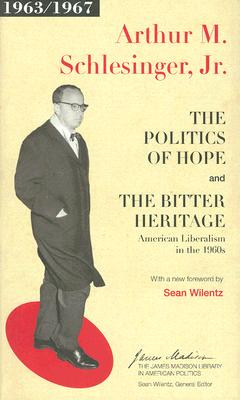

 Princeton University Press
Princeton University Press
The Politics of Hope and the Bitter Heritage: American Liberalism in the 1960s


Key Metrics
- Sean Wilentz
- Princeton University Press
- Paperback
- 9780691134758
- 7.92 X 4.94 X 1.25 inches
- 1.24 pounds
- Political Science > Essays
- English
 Secure Transaction
Secure TransactionBook Description
The Politics of Hope and The Bitter Heritage brings together two important books that bracket the tempestuous politics of 1960s America. In The Politics of Hope, which historian Arthur Schlesinger, Jr., published in 1963 while serving as a special assistant to President Kennedy, Schlesinger defines the liberalism that characterized the Kennedy administration and the optimistic early Sixties. In lively and incisive essays, most of them written between 1956 and 1960, on topics such as the basic differences underlying liberal and conservative politics, the writing of history, and the experience of Communist countries, Schlesinger emphasizes the liberal thinker's responsibility to abide by goals rather than dogma, to learn from history, and to look to the future.
Four years later, following Kennedy's assassination and the escalation of America's involvement in Vietnam, Schlesinger's tone changes. In The Bitter Heritage, a brief but penetrating appraisal of the war that nobody wanted, he recounts America's entry into Vietnam, the history of the war, and its policy implications. The Bitter Heritage concludes with an eloquent and sobering assessment of the war's threat to American democracy and a reflection on the lessons or legacies of the Vietman conflict.
With a new foreword by Sean Wilentz, the James Madison Library edition of The Politics of Hope and The Bitter Heritage situates liberalism in the convulsive 1960s--and illuminates the challenges that still face liberalism today.
Author Bio
Sean Wilentz studies U.S. political and social history. He received his Ph.D. in history from Yale University (1980) after earning bachelor’s degrees from Columbia University (1972) and Balliol College, Oxford University (1974).
Chants Democratic (1984), which won several national prizes, including the Albert J. Beveridge Award of the American Historical Association, shows how the working class emerged in New York City and examines the changes in politics and political thought that came with it.
In The Kingdom of Matthias (1994), Professor Wilentz and coauthor Paul E. Johnson tell the story of a bizarre religious cult that sprang up in New York City in the 1830s, exploring in the process the darker corners of the 19th-century religious revival known as the Second Great Awakening. Professor Wilentz is also the coauthor and coeditor of The Key of Liberty (1993) and the editor of several other books, including The Rose and the Briar (2004, Greil Marcus coeditor), a collection of historical essays and artistic creations inspired by American ballads.
His The Rise of American Democracy: Jefferson to Lincoln (2005), was awarded the Bancroft Prize and was a finalist for the Pulitzer Prize. Subsequent books include The Age of Reagan: A History, 1974-2008, a reconsideration of U.S. politics since the Watergate affair; Bob Dylan in America, a consideration of Dylan's place in American cultural history; and The Politicians & The Egalitarians: The Hidden History of American Politics, a thematic collection of essays covering American political history from the Revolution through the 1960s.
His most recent study, No Property in Man: Slavery and Antislavery at the Nation’s Founding, based on his Nathan I. Huggins Lectures at Harvard, appeared in 2018 and was the recipient of the annual Thomas A. Cooley Book Prize for the best book on the Constitution, awarded by the Georgetown University Law Center. In 2020, the Library of America published the first of three projected volumes of his authoritative edition of the writings of the historian Richard Hofstadter.
Professor Wilentz has received numerous fellowships from, among other institutions, the John Simon Guggenheim Foundation, the American Council of Learned Societies, and the American Academy in Berlin. Formerly a contributing editor to The New Republic, and currently a member of the editorial boards of Dissent and Democracy, he lectures frequently and has contributed some four hundred articles, reviews, and op-ed pieces to publications such as the New York Review of Books, the New York Times, the Washington Post, the Los Angeles Times, The Atlantic, the London Review of Books, The American Scholar, The Nation, Le Monde, and Der Spiegel.
He has also given congressional testimony, notably before the House Judiciary Committee in 1998. His writings on American music have earned him two Grammy nominations and two Deems Taylor-ASCAP awards.
Source: Princeton University
Videos






Community reviews
Write a ReviewNo Community reviews